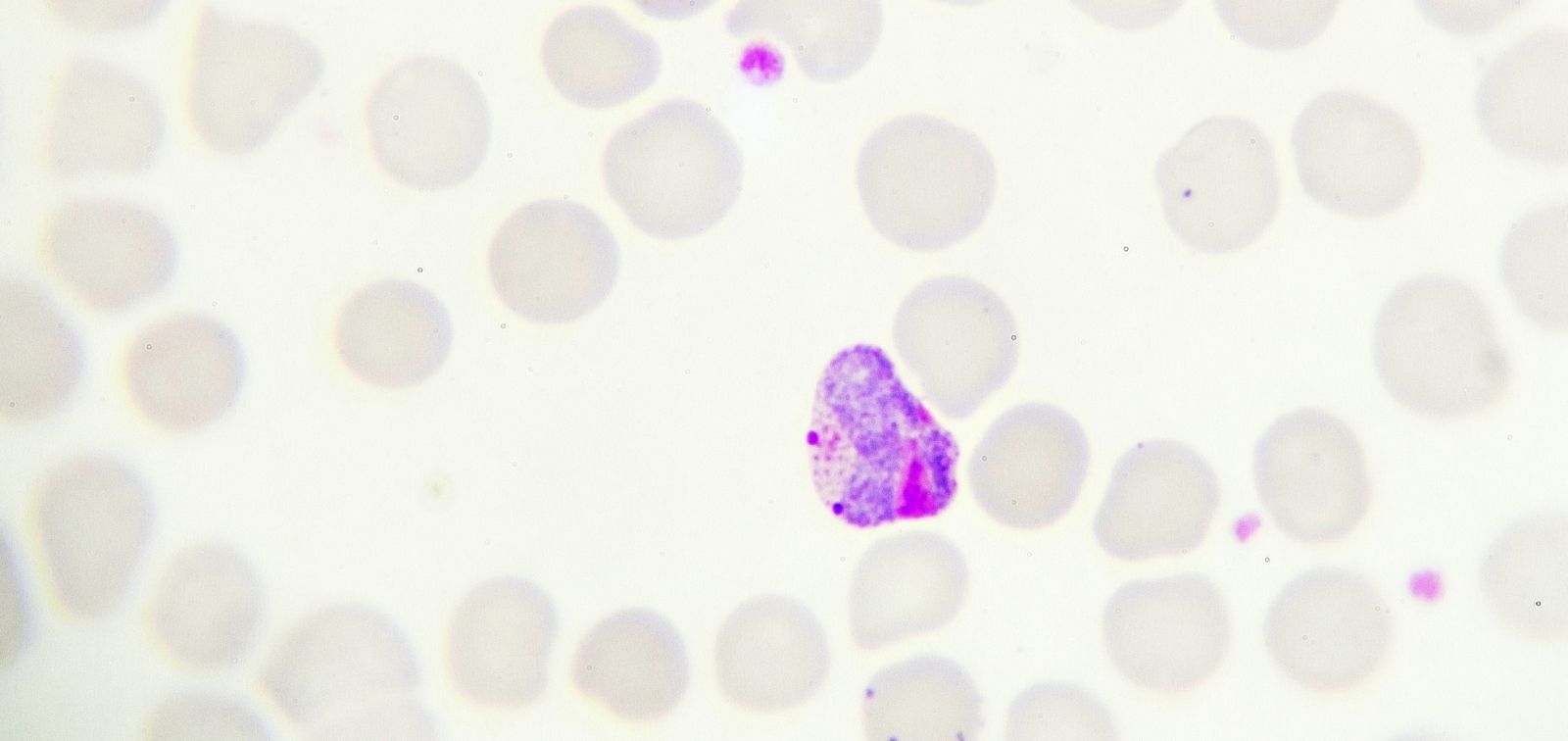GlycoTargets
New antimalarial therapies targeting the glycosylation pathways of ‘Plasmodium falciparum’

- Duration
- 01/09/2024 - 31/08/2026
- Coordinator
- Luis Izquierdo Lázaro
- Funded by
- Ministry of Science and Innovation - Agencia Estatal de Investigación
Malaria is a serious global health problem that kills more than 600,000 people a year —mainly children under five and pregnant women in sub-Saharan Africa— with the Plasmodium falciparum parasite causing the most severe form of the disease and the highest number of deaths.
It should be noted that malaria is a preventable and curable disease, and artemisinin-based combination therapies are one of the main tools for its control. However, the extraordinary metabolic plasticity of P. falciparum makes it susceptible to developing resistance to any treatment that is discovered. Indeed, artemisinin resistance is beginning to emerge in the Greater Mekong Subregion, underscoring the urgent need to develop new tools and therapies to combat the disease.
Recent results from the Glycobiology and Malaria Parasite Biology Group and other research groups confirm that glycoconjugates play a key role in the development of P. falciparum. Indeed, the parasite appears to be particularly sensitive to disruption of these glycosylation mechanisms, according to data from several sources. We hypothesise that certain glycosylation pathways, namely the hexosamine biosynthesis pathway (HBP), glycosylphosphatidylinositol (GPI) biosynthesis and N-glycosylation, may be excellent unexplored targets for the development of new strategies to halt parasite growth.
BPH is a lateral pathway of glycolysis that generates uridine diphosphate-N-acetylglucosamine (UDP-GlcNAc), a nucleotide sugar essential for asexual parasite development and involved in the biosynthesis of GPI anchors and N-glycans. GPIs are the most prominent form of protein glycosylation in P. falciparum and anchor essential proteins to the parasite surface during different stages of its life cycle. Finally, N-glycosylation is an essential process in most eukaryotes that takes place in the endoplasmic reticulum and modulates the folding, stability, trafficking and function of proteins expressed in the secretory pathway.
Our recent results indicate that N-glycosylation is active and essential for the survival of P. falciparum in its intraerythrocytic asexual stages. Surprisingly, parasites with altered N-glycosylation show a peculiar 'delayed death' phenotype, in which they do not stop replicating until the second cycle after the alteration. Notably, delayed death has previously been described in P. falciparum in association with apicoplast-targeted inhibitors. The unexpected relationship between N-glycosylation and delayed death raises interesting new questions that deserve further investigation due to their importance for parasite biology and survival.
In this proposal, we will use virtual screening based on 3D structure predictions and CRISPR-Cas9-mediated genetic engineering to chemically and genetically validate the three above-mentioned pathways as drug targets for the design of novel antimalarial drugs. We propose to focus on the identification of new compounds capable of arresting parasite growth by inhibiting these pathways. In summary, we will adopt a basic research approach with the aim of identifying urgently needed molecules capable of eliminating the malaria parasite through novel mechanisms of action.
Total funding
247,500.00 €
Funded by the Ministry of Science and Innovation - State Research Agency. Reference: PID2022-137031OB-I00 Call: Knowledge Generation Projects.

Our Team
Coordinator
-
 Luis Izquierdo Lázaro Associate Research Professor
Luis Izquierdo Lázaro Associate Research Professor
ISGlobal Team
-
 Maria Pia Alberione Predoctoral Researcher
Maria Pia Alberione Predoctoral Researcher -
Àngel Fenollar Predoctoral Researcher
-
Jonathan Ortega Laboratory Technician
-
 Miriam Ramírez Laboratory Technician
Miriam Ramírez Laboratory Technician -
Tais Romero Predoctoral Researcher
Other projects
See Past ProjectsNHEPACHA
New Tools for the Diagnosis and Evaluation of Chagas Disease
RTS,S Vaccine Immunology Study
Study of immune correlates of protection against malaria after vaccination with RTS,S/AS01E: a comprehensive immunological arm of a Phase III double-blind, randomized, controlled multi-center trial
Euroleish.net
Control of Leishmaniasis. From bench to bedside and community
GREPIMER
Grup de recerca en patología importada i malaties emergents i re-emergents
TESEO
New chemotherapy regimens and biomarkers for Chagas Disease
ASINTMAL
Unravelling Disease Tolerance and Host Resistance in Afebrile 'P. falciparum' Infections: a Prospective Study in Mozambican Adults
ADAM
Malaria mass and focal drug administration to advance malaria elimination in Mozambique: accelerating programmatic implementation and policy translation
Science4Pandemics
Citizens engagement digital platform for collective intelligence in pandemics
HIDDENVIVAX
Novel organ-on-a-chip technology to study extracellular vesicles-mediated cryptic infections in Plasmodium vivax malaria
Subclinical Infections in Children and Long Term Health Effects
Infection acquisition in early life and health outcomes in childhood - MARATO TV3
Herramienta innovadora de detección de enfermedades y vacunación a población inmigrante en riesgo en España
Project Code: PI21/00651
Impacto de las coinfecciones en el balance de respuestas de anticuerpos y linfocitos T helper a antígenos diana de inmunidad natural y vacunal frente a patógenos humanos prominentes
Project Code: PI20/00866
EpiGen
Building Scalable Pathogen Genomic Epidemiology in Ethiopia
MalTransc
Transcriptional regulation of adaptation and developmental decisions in malaria parasites: from epigenetic variation to directed transcriptional responses
BOHEMIA
Broad One Health Endectocide-based Malaria Intervention in Africa
RESPONSE
Mechanisms of the transcriptional responses to changes in the environment in the malaria parasite Plasmodium falciparum
VivaxEVTalk
Extracellular Vesicles as Intercellular Communicators and Biomarkers of Cryptic Erythrocytic Infections in Plasmodium vivax malaria
VaMonoS
Unravelling the heterogoneity and function of monocytes in vaccination and immunity to malaria
CLIMSOCTRYPBOL
Insight on climate and social participatory research for integral management of vectorborne zoonosis caused by Trypanosoma cruzi and Leishmania spp. in the Bolivian Gran Chaco.
SexMal
Social affairs and sex in P. falciparum: implications for malaria elimination
MENA Migrant Health
Transforming data collection and surveillance to drive migrant health research, care and policy
MESA
Sharing knowledge and catalyzing research towards a malaria-free world
SMART
Identifying Severe Malaria with a new Aptamer-based Rapid diagnostic Test
GenMoz
P. falciparum genomic intelligence in Mozambique




